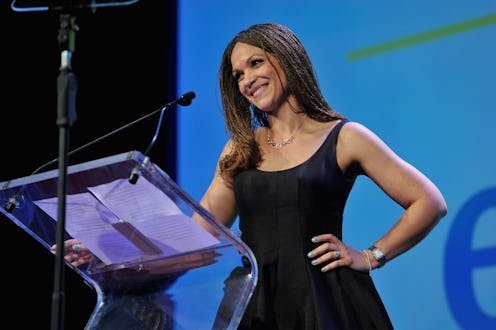News
Melissa Harris-Perry Tells 'Elle' About WHCD
The White House Correspondents' Dinner is a coveted event that politicians, reporters, comedians, and celebrities look forward to attending every year. But former MSNBC Host Melissa Harris-Perry has reportedly passed up invitations to the WHCD for the past four years. In an essay for Elle.com, where she's now working as an editor-at-large, Harris-Perry explained she has skipped the event because it perpetuates "interpersonal coziness between policy makers and the journalists who purportedly hold them accountable." But this year she decided to attend and she went with a purpose. Harris-Perry attended the WHCD to support LGBT media and to elevate the "importance of allies and intersectionality within LGBT political movements."
In February, Harris-Perry left her own MSNBC show because the network reportedly wanted her to focus more on presidential election coverage, even though Melissa Harris-Perry typically covered issues like racism and social justice. "I will not be used as a tool for their purposes. I am not a token, mammy, or little brown bobble head," Harris-Perry wrote in an email to the show's staff.
So it was only fitting that this issue was brought up during Harris-Perry's first WHCD dinner in four years. Host Larry Wilmore commented on her decision to suspend her MSNBC show in his monologue. Wilmore of course incorporated humor to lighten the mood, but his views on the situation and on what MSNBC has become were so real it hurt. MSNBC "now stands for 'Missing a Significant Number of Black Correspondents,'" Wilmore said.
Harris-Perry went on to win the evening with an epic response on Twitter.
If Harris-Perry hadn't attended the WHCD this year, she wouldn't have witnessed Wilmore's daring monologue and the subsequent responses from the MSNBC table. But that's not why she went to the event; according to her essay, Harris-Perry was invited by the Washington Blade and that's why she decided to show up this year.
The Blade is one of the oldest LGBT newspapers in the country, founded in 1969. Although the paper shut down abruptly in 2009 due to financial difficulties, it has since bounced back and focused on covering queer folk of color.
As The Blade explained, Harris-Perry was invited for her work as an ally to the LGBT community. However, in her essay, Harris-Perry explained that she sees her involvement in the LGBT rights movement as much more than that of an ally, a designation that she said makes her just as uncomfortable as the dinner itself:
Just as the idea of a fancy White House Correspondents's Association Dinner makes me uncomfortable, so too does the designation of ally. I am a cis, straight woman who lives and votes in North Carolina. I am not an ally; I am already fully invested. I am a citizen, a neighbor, an aunt, a sister, a mother, a friend, a teacher, an employer. I have a fundamental responsibility to help dismantle inequality; if I don't I am actively participating in perpetuating it. And as a black woman I am vulnerable to these interlocking systems of oppression, so the work is not altruistic.
But ultimately, Harris-Perry wrote that it was worth attending the WHCD to draw attention to The Blade and to LGBT media inequality. "There is another point to be made by the five people representing The Washington Blade on Saturday night ― the sheer progress of LGBT media having five tickets to the dinner."
Until 1944, black reporters weren't allowed to cover presidential news conferences. Women couldn't go to the WHCD until 1962 when correspondent Helen Thomas convinced President Kennedy not to go unless women were invited.
For LGBT media, the date was much more recent. The Washington Blade received its first press pass during the Reagan administration, but its reporters were never called on. The same thing held true through the Clinton Administration and George W. Bush's first four years. Then, after Bush's reelection, The Blade's pass was revoked. "How can an administration be held accountable to a community if the media professionals with a dedicated interest in representing the interests of that community are silenced, shut down, and shut out?" Harris-Perry wrote in her essay.
Luckily that situation has changed for the better since President Obama was reelected in 2012. The paper was given credentials again at midnight the day Obama took office. In 2013, The Blade joined the White House Press Pool. Since then, someone from the paper has been the official reporter of record on the President's activities in Washington, D.C. — a first for LGBT media. As The Blade editor Kevin Naff explained, "It's been a long, slow haul. Believe it or not, having five tickets for the dinner is a pretty big deal for LGBT media."
With this in mind, Harris-Perry's views on the WHCD shifted and she decided that attending the event could be a way to promote LGBT media equality:
In the end, the White House Correspondents' Association dinner is a slightly inappropriate, fancy meal in a big ballroom one night a year. It is not the engine of accountability for democracy. But it is one symbol of inclusion. It is a tent that is either big enough for everyone or not. It is the table to which people are invited or from which people are shoved away. So I put on my good shoes, took Kevin's arm, and stood proudly at all those complicated, messy intersections of identity and democracy because sometimes, you just have to go to the power party.
Be glad there's a space at the table for her. There will surely be many more events that could benefit from Harris-Perry and her commitment to speaking out for equality.
